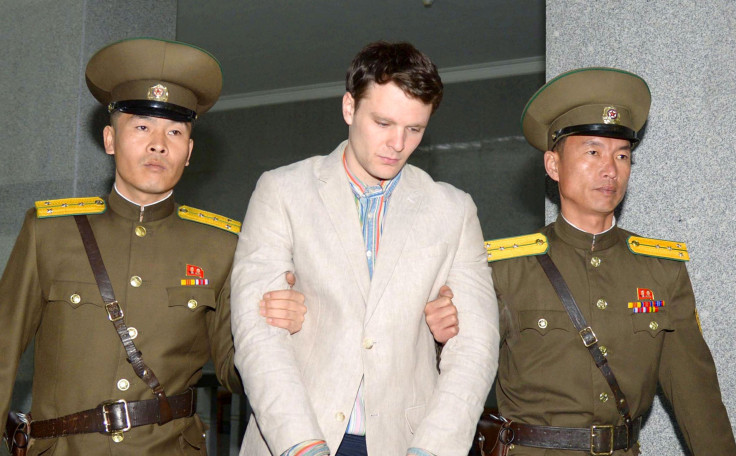How Are Prisoners Treated In North Korea? Otto Warmbier's Parents Call Pyongyang 'Pariah' Regime

After spending more than 17 months in detention in North Korea, American college student Otto Warmbier, 22, returned to the U.S. on Tuesday night. Warmbier has been in coma for over a year, according to his parents, and was rushed to the University of Cincinnati Medical Center late Tuesday after he arrived, reports said citing a hospital spokeswoman.
The parents of Warmbier — who was sentenced to 15 years of hard labor in March 2016 for attempting to steal a propaganda sign from a hotel — told the Associated Press that they were told their son had been in coma since his trial, when he was last seen in public, and they had learned of this only one week ago. They also said: “We want the world to know how we and our son have been brutalized and terrorized by the pariah regime in North Korea...We are so grateful that he will finally be with people who love him.”
Read: 3 US People Imprisoned In North Korea After Release Of Otto Warmbier
The Warmbier family cited the North Korean officials, who claimed that Warmbier slipped into a coma after being given a sleeping pill and since then, he has remained in a coma, the Washington Post reported.
Warmbier was hospitalized after the flight carrying him landed in Ohio on Tuesday.
Warmbier is not the only one to have gone through brutal treatment in prison, as his parents said, but there are other accounts from citizens who have survived the period spent behind the bars and have later escaped the regime.
“Conditions are horrific. People are worked for 14, 15 or 16 hours every day with just a handful of corn to live on and they are intentionally starved and worked to death,” a report said citing Suzanne Scholte, chairman of the North Korea freedom coalition, a group of organizations based in Washington D.C. assisting defectors and campaigning for improved human rights.
"Torture is common, there is no medical aid and the sanitation is horrible. They wear the torn uniforms of old prisoners and sleep crammed together in a room," she added.
Jeong Kwang-il, who was accused of spying and sent to the brutal jail in North Korea for political prisoners, wrote an article in the Guardian, sharing his ordeals in the prison. "Life in the prison camp was repetitive. It was a life of being investigated and beaten. My weight dropped drastically, falling from 75kg to 35kg."
Read: Inmates Remain Loose After Killing 2 Prison Guards In Putnam County
"I was tortured using the so-called pigeon torture, which means my two hands were tied behind my back and I was handcuffed so I could not stand or sit. I could not sleep at all." He added: "Political offenders were confined underground. They were not allowed to go to the toilet so they had to urinate in their cells. My voice was not heard above ground. Sometimes the guards would say, 'you had better die.' Actually, two other prisoners died there. Only I survived."
Lim Hye-jin, a former guard at a North Korean concentration camp, who later fled North Korea, shared tales of prisoners being beheaded as punishment and days-old babies being buried alive, according to Mirror. Lim narrated an incident where a woman was stripped naked and burnt alive for annoying a guard during interrogation.
While North Korea has reportedly denied the existence of vast political prison camps, according to a 2014 UN special commission report, a combination of satellite images and testimonies from people showed that those camps are still in operation in North Korea. The prison camps inflict torture on citizens, who simply disappear without their families knowing of what happened to them, no matter if the prisoners subsequently die in detention.
© Copyright IBTimes 2024. All rights reserved.






















